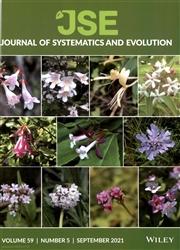苔藓植物系统发育组:基于质体系统发生组数据的修订科分类系统
IF 2.9
1区 生物学
Q1 Agricultural and Biological Sciences
引用次数: 0
摘要
苔藓植物是一个单系类群,由三个主要品系组成,在陆生植物陆地化之后不久就出现了多样化。然而,它们的内部系统发育关系仍存在争议。在这项研究中,我们利用迄今为止最大的质体数据集重建了叶绿体的序和科的系统发育,其中包括 549 个分类群,几乎代表了所有已知的目和科的三分之二。得到强有力支持的系统发育推论使我们在苔藓植物中提出了七个新分离的科,即秃头蕨科(Baldwiniellaceae)、萼片蕨科(Calyptrochaetaceae)、栉水母科(Ctenidiaceae)、酢浆草科(Herpetineuraceae)、异酢浆草科(Isodrepaniaceae)、假酢浆草科(Pseudotaxiphyllaceae)和萝茨科(Rozeaceae),以及一个缩小了的科,即攀缘植物科(Climaciaceae)。我们还将肝草科 Calyculariaceae 从 Fossombroniales 转入 Pelliales。分子系统发育的最新进展彻底改变了红叶植物的分类方法,使其更趋于片段化。因此,我们进一步提出了一个经修订的苔藓植物科分类系统,其中包括苔藓植物的 45 目 142 科、肝草植物的 23 目 85 科以及角草植物的 5 目 5 科。本文章由计算机程序翻译,如有差异,请以英文原文为准。
The Bryophyte Phylogeny Group: A revised familial classification system based on plastid phylogenomic data
Bryophytes, a monophyletic group comprising three major lineages, diversified soon after the terrestrialization of land plants. However, their internal phylogenetic relationships remain controversial. In this study, we reconstructed the ordinal and familial phylogeny of bryophytes using the largest plastid data set to date, including 549 taxa that represent almost all known orders and two‐thirds of families. The strongly supported phylogenetic inference enabled us to propose in mosses seven newly segregated families, that is, Baldwiniellaceae, Calyptrochaetaceae, Ctenidiaceae, Herpetineuraceae, Isodrepaniaceae, Pseudotaxiphyllaceae, and Rozeaceae, and one reduced family, that is, Climaciaceae. We also transferred the liverwort family Calyculariaceae from Fossombroniales to Pelliales. Recent advancements in molecular phylogeny have revolutionized bryophyte classification, tending to be more fragmental. Hence, we further propose a revised familial classification system for bryophytes that includes 45 orders and 142 families in mosses, 23 orders and 85 families in liverworts, and five orders and five families in hornworts.
求助全文
通过发布文献求助,成功后即可免费获取论文全文。
去求助
来源期刊

Journal of Systematics and Evolution
Agricultural and Biological Sciences-Ecology, Evolution, Behavior and Systematics
CiteScore
7.40
自引率
8.10%
发文量
1368
审稿时长
6-12 weeks
期刊介绍:
Journal of Systematics and Evolution (JSE, since 2008; formerly Acta Phytotaxonomica Sinica) is a plant-based international journal newly dedicated to the description and understanding of the biological diversity. It covers: description of new taxa, monographic revision, phylogenetics, molecular evolution and genome evolution, evolutionary developmental biology, evolutionary ecology, population biology, conservation biology, biogeography, paleobiology, evolutionary theories, and related subjects.
 求助内容:
求助内容: 应助结果提醒方式:
应助结果提醒方式:


